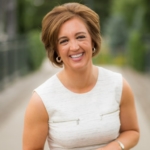
Gobble Founder Ooshma Garg Moves On From Intelligent Foods As CEO, And Does It With Wellness
“I was hiding burnout for a long time,” says former Gobble and Sunbasket CEO, Ooshma Garg. She’s very candid with me about her journey to move on from her former roles, roles which have informed every facet of her life for the past 13 years. But she’s moving on from CEO-ship in a very anti-Silicon Valley way–through wellness.
Garg, who is no longer the CEO of Gobble and Sunbasket as of a few short months, stepped away from her job without fanfare, a formal announcement, or gaining funding on the next thing. She will not be going in-house at a venture capital firm (or becoming a venture capitalist herself) and is not moving directly into another project.
Although, she says, “Those types of opportunities arose pretty quickly.”
Instead, she constructed her exit around a personal wellness journey, one she designed for herself rather than via a wellness retreat, and during our interview, she’s taking time with her words, to be thoughtful on how best to articulate her new path. This is, after all, uncharted territory for her.
“We’re not talking about a product launch or a fundraising round, which I’ve done so many times,” says Garg about this interview. “This type of conversation is totally new for me and this process of transition comes with a blank page, which brings up the full buffet of emotions.”
Her candidness is beyond admirable. Indeed, it feels like a necessary shedding of light on a part of the Founder experience which is rarely spoken of: the toll on one’s self when building a business from scratch in Silicon Valley.
It’s true that, in a world where superstar founders successfully exit one project and jump into the next while riding the wave of their reputations, Garg’s desire of going directly into a phase of self-care is novel.
“I was letting work seep into all hours of the day,” she says about this decision. “The imbalance came from working the same parts of my brain day-in and day-out to continue growing this business, its revenues and profits. It required management skills, negotiation skills, presentation skills, the same kinds of skills, more and more, over and over. And there was no one to tell me to stop, or help me enforce boundaries with work.”
Garg takes a moment to make very clear her times as CEO of Gobble and Sunbasket were incredible, fulfilling and enriching experiences, pointing out that burnout and satisfaction of one’s job can be mutually exclusive. In this mutual exclusivity, however, there is the existence of a massive disconnect of which people in her position rarely speak.
“I felt at times like there was a large gap between who I really am and what I was required to do or project as a CEO,” Garg says. “It also seems like burnout is a growing epidemic in America today, especially with people working almost exclusively through Zoom. Work life has become so blurred and transactional. Plus, we’re navigating past this pandemic without much healing.”
So instead of the next big thing, Garg did the next best thing for her and structured this transition based on reading, research, and being profoundly frank with herself by acknowledging what she needed to recover.
“There were a number of critical ingredients,” Garg declares, as she explains that digital detox, the creation of a safe space, being in an energizing environment, and the desire to not meet new people were all important facets of the retreat for her.
“I didn’t want to have group communal dinners or be forced into an agenda or program, and it gave me deep joy to not have to care about anybody else but myself,” she says.
Garg constructed her personalized retreat to take place over the course of 5 days in Hawaii, integrated a healthy diet based in Japanese cuisine, partook in sunrise and sunset yoga, and dressed up for her nightly meals at fancy restaurants without a phone or a book as to be alone and enjoy her own company.
“I was able to recognize that I may not get this moment in life many times. So, from the very first second, I looked at this transition very intentionally and tried to be considerate of my environment, my interactions, my reading, my daily schedule and actions all thoughtfully to create space for me,” Garg explains. “I’m very nourished by my family and friends, but I also think I’m a better person for knowing I can nourish and enjoy myself.”
Her experience flew in the face of society’s expectations and, even, familial expectations as American culture values productivity as one of its core tenets, while her family’s values include the ethos of hard work and a life lived without idle hands and mind. According to Garg, her family raised concerns that her quality of life would deteriorate as a result of not working.
There was also the part of being a woman and the fear many women have around scarcity of opportunities, compounded with the perception that women are unable to re-enter the workforce successfully after an absence.
Clearly, Garg has made the conscious–and informed–decision to disagree with these ideas and expectations.
“It’s a huge shift to now own the idea of doing nothing. And I’ve meditated on the concept of nothing and believe that it’s not frivolous, it’s not luxurious. It’s actually difficult and extremely meaningful, and it’s necessary towards creating a meaningful something that follows,” she says.
“I have spent a lot of my life producing and we live in a culture of production—of daily production of articles or of content, of posts about our breakfast—but mastery and meaningful work or impact takes time,” Garg adds. “I think it’s very powerful to understand the relationship between nothing and something when it comes to space and impact.”
Doing things her own way is hardly new for her. Garg admits her way of playing the startup game was “not sexy at all,” that she did it by putting one foot in front of the other, brick by brick, and doing everything the “right way, which is often the hard way,” she says, and that many investors or friends urged her to do it differently. Nevertheless, Garg listened to her consumers and competed only with herself, ignoring the grades and metrics of her competitors.
The result was that Gobble operated outside of the typical Silicon Valley model. It is one of the only startup-slash-private companies to have built a business profitably, rather than through massive investment and then being forced to sell when the money ran out, something which she describes as the fate of most Silicon Valley startups.
She advises new Founders to take the same independent approach. “My advice to any entrepreneur, but especially to women, would be to be bold and unapologetically bold, and even selfishly, bold,” Garg enthuses.
Empowered with wisdom and experience, she possesses an imbued a sense of knowing with her current path having already built something from nothing and is armed with strong sense of faith in positive outcomes.
“I’m confident that even with nothing given to me, I will be able to contribute and build something again from nothing that is very meaningful,” she concludes. “Entrepreneurship is about bending reality to your will. So is life.”





